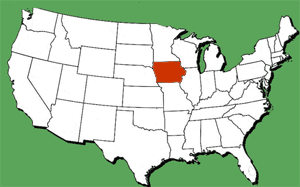
Circle the area on this map

B. New Hampshire has a state law that says it must be the first state to hold a primary in a presidential election, but the Jan. 10 primary follows Iowa's caucuses. These early contests are important because candidates can gain or lose support - and campaign contributions - based on the vote results.
A. New Hampshire ranks 42nd in population with about 1.3 million people, and Iowa ranks 30th in population with about 3 million people. With more than 37 million people and nearly 12 percent of the nation's population, California is the most populous state. But, it's primary in June is one of the last votes in this year's race for the nomination.
D. Iowa is often viewed as a farming state, but manufacturing's share of the state's diversified economy is more than six times larger than agriculture. A relatively low state unemployment rate has made the economy less important to Iowans than most of the nation's voters.
C. All the electors who meet in Des Moines next December will be pledged to the presidential candidate who receives the most Iowa votes in the November general election. All but two states use the same "winner-take-all" method of picking electors. As it did in 2000, the system can sometimes elect a president who did not receive a majority of the nation's popular vote